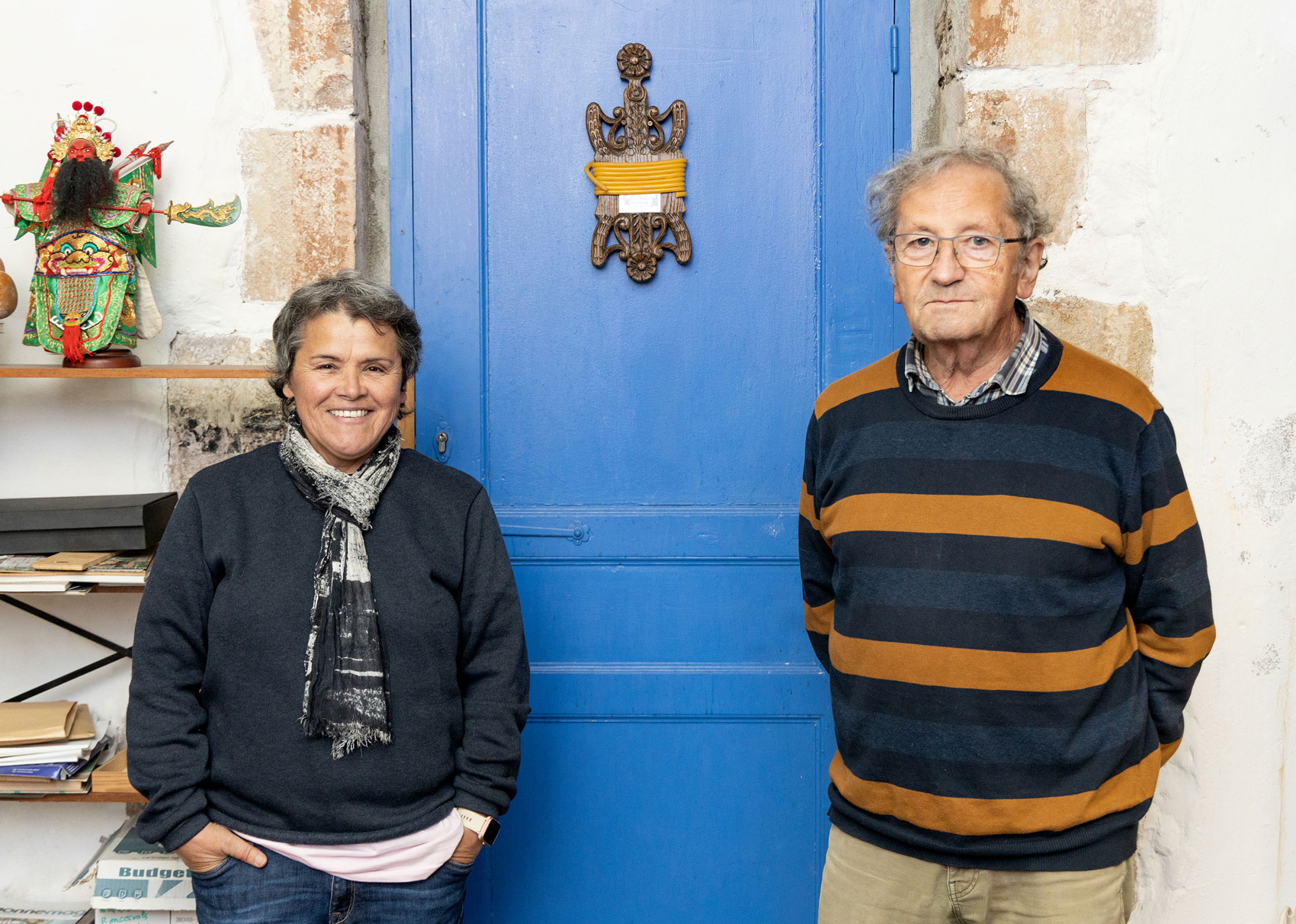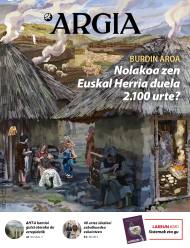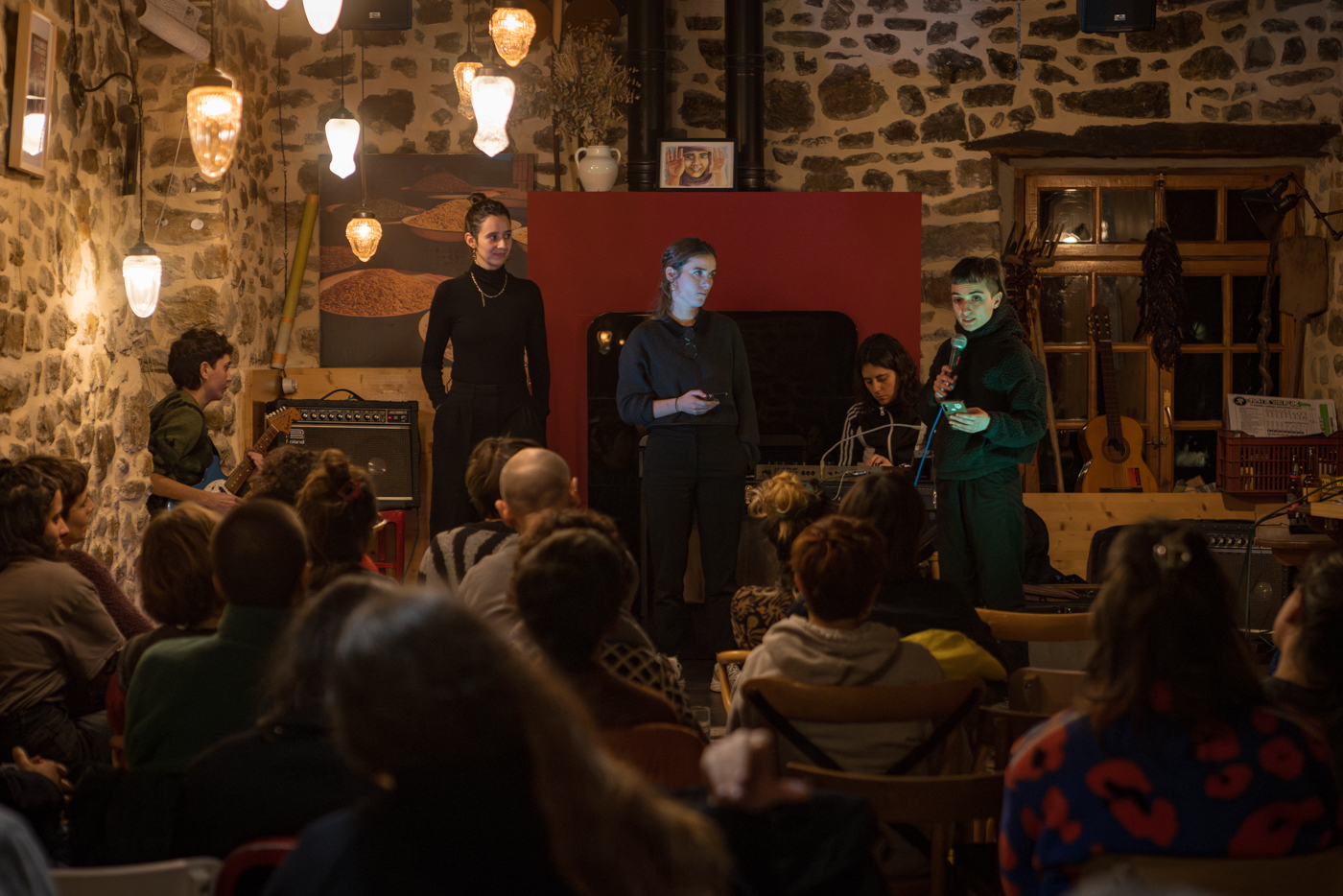Florida literature in Terra nullius
- 40 years ago, Mayo magazine was created in order to offer people writing in Lapurdi, Baxenabarre and Zuberoa the opportunity to enter and write. It has been an essential tool for Basque literature: in addition to 74 copies, about 190 books have been published since 1982. Luzien Etxezaharreta and Itxaro Borda, founders of May, have brought us to the environments, aspirations and challenges of the 1980s; and to Amaiur Epher and Xan Idiart, young Bajonavarras writers, to learn the vision of the youngest in the house.

Appearance of a notebook in A4 format entirely in black and white: black background, May and number of copy in white and an illustration between them. This is how the first issue was published in the first quarter of 1982, and after 40 years, it still looks the same: a minimalist precision, simple, without furfurfury. In the prologue of 1982 you could read: A magazine, ours. There are things, of all, in Basque, workshops. Our literature. Literature, why? Because our families have not spent their lives alone. Love, work, sadness and mountains, hope and happiness of one night in Basque. We hope that ours will be in Basque. Literature for us. No deaths, for cold research and for its exhibitors with ash. For living literature.
About twenty people gathered around the first number without imagining that this literary adventure would take them here, responding to the Luzien Etxezaharreta and Itxaro Borda's gummy. Two writers who until then did not know each other very well placed between the two questions “Who writes in Basque?” and formed the list. Besides the two that do not have to be presented, Auxtin Zamora, Jon Cazenave, Jean-Louis Davant, Daniel Landart, Aurelia Arkoxa, Henriette Aire, Emilio López Ribadán Beltza, as the death of the late Cascabel of Aberaut Etxaintzi has moved this year. We met with Etxezaharreta and Borda at Mayo headquarters on Passemillo Street in Baiona, on a rainy and cold November afternoon, thanking
Etxezaharreta for bringing hot coffee in the thermostat. The headquarters is filled with cardboard with magazines of 40 years. Aware of the richness surrounding him, “they are numbered, right?” asks the disturbing journalist that everything represents a fire. They have not answered clearly – one no, another yes – and that anguish has been associated with the list of questions in the liver.
In the 1980s there were people writing in Lapurdi, Baxenabar and Zuberoa, but in isolation, writing columns or articles in the media: “In the end we were many, but it was not a meeting point.” May was created to fill that gap. There were also very few books written in Basque. Etxezaharreta recalls that in the Langue, Basque littérature et civilisation [Basque language, literature and civilization], organized by the University of Bordeaux, books were offered in Basque: “[Pierre Narzen] Kattalinen kontuak, Xaramela, Otsobi alegiak, Toer-Lafitten hiztegia, Borda says they come from a terra nullius. This land was fruitful, with a total of 74 copies and 190 books published for four decades.

In the epilogue of the first journal one could read that we do not want the compost of another language. To the timid and to the meticulous nature of the ends we have nothing to err: the future, which is done only by doing… They have travelled the way in Basque: “What is a language that has no literature? So you can't live. Literature brings many things,” says Etxezaharreta. Some have also been published in French, following the spirit of freedom at their base, “with the freedom to disseminate the works of their friends”.
They are based on freedom and compass. “We didn’t want to show a nice Basque Country, we didn’t want folklorism; we wanted to show Basque Country with its wounds and pains,” Borda said. It is also reflected in the diversity of the sunken gender and in the dialects that we can originate. Its long absence from the logic of subsidies and its imprint on a purely commercial approach relate to it: “The money spent on a commercial structure has to have a result, it has to pay the workers… it is another system, we are not”.
“Many fantasies and few funds,” explains Mayo Piarres, Euskaltzale founder of the weekly Lafitte Herria, whose first number includes an interview with Lafitte. As part of a cure, criticism was considered a flower. But Etxezaharreta warns Borda that Lafitte changed his gaze over time: “We were alone in our time, you are a group. Long live you,” he confesses at some point who was Lafitte.
The first issue of the magazine was very successful: they had to print 500 copies and take out a second edition. “Ours was the result of the vasophile movement and was well seen.” However, the writing of the literary journal required many implications: “We were five or six to do everything; the guhaurs we pictured, we layout, we took a printing press, we made goals, we distributed, we sold… From writing to reading”.
Although the literary landscape of 1980 was poor, the political environment was at a snare: fights were fought by the ikastolas, the first Basque radios appeared, the peasants also decided to form the ELB union, the fight for liberation was tremendous and the repression of the states was brutal with murders and detentions of the GAL. What to say about the Franco dictatorship in Hego Euskal Herria. “Obviously, the fighting literature was not enough, but nevertheless, I believe that literature had its place and less evil that it had that place,” says Borda.
In all the capitals of Euskal Herria, the 1980s was a time of literary magazines: Susa in San Sebastian, Ttu-ttua in Bilbao, Korrok in Pamplona and Kandela in Vitoria... Mayo joined the literary map.
In 1981, François Mitterrand won the seat of the French president, placing right in the losers’ area, “With Mitterrand there was a strong cultural movement, things were changing, and you will think what you wanted, but it happened as a liberation,” Borda said.
Beginning in 1984, books began to be published, starting with the poetry La vida de Borda. The two interviewees agree that if May were not the case, most books would not be published. Translation has also taken place, as both have as a bridge between different languages and literary worlds. Suppose that This love (Cet amour) of the great Jacques Prevert is translated into Basque in the first issue of 1982.
A lab for anyone who wants
“It was a training space, we could see how people got the text: it was a laboratory for us,” says Borda. Many have taken the first step in that plaza, then to other publishers or to other areas, such as the Basque Country, research, journalism... Since the beginning, the writers have had an important place in May, which is not for the traditionalist Northern Basque Country of the 1980s. As an example, Mayi Pelot, one of the pioneers of Basque science fiction and Marijane Minaberri.
.jpg)
Writing is not an easy process, it is a work that requires time and in this exercise touching a net is worth gold. Etxezaharreta is clear: “If whoever has power has no appreciation, respect or complicity, he will not write it. It is difficult to write, it is not something that is created immediately, so it is very important to have a group around you”. This is the role that May plays.
There are also young people, writers just started in this "lab." These include Bajonavarras Amaiur Epher and Xan Idiart. Epher published his first book Profeten iruzurra with Mayo in 2021; and Idiartek published his stories in the magazine (with the editorial Elkar published last year the first book Teresa mendekua). Both consider this literary space of the Northern Basque Country essential: “There is diversity, the doors open to operation are open to all people and that is what is appreciated”. He adds, “It has an anarchist side, that guhaurk spirit I really like.” He is aware of the implication that this implies: having to go to fair to present the book. Remember the book as an experience that has loved human exchange. Idiarte also sees Mayo as a “jerez” and an “opportunity”: “Eneo is a xantza because I cannot stop seeing the time to write and I do not always take it. Luzien [Etxezaharreta]’s request for the magazine serves me to get to work and enjoy the activity.” Both highlight Etxezaharreta’s extensive contribution: “He is passionate about literature, with great knowledge and generosity,” according to Idiart.
Bearing in mind the degree of commitment required by an association, the fact that it has done so since the age of 40 is very diverse. As could not be otherwise, Etxezaharreta and Borda look to the future: they need hands to take the witness. New names are added to the journal index, which guarantees them part of the series. Involvement? The “support” received is also evidenced by the two young writers who, both when writing and publishing the book, consider it essential, it may be thought that the young writers of today and tomorrow will also perform the task of maintaining the complete network. It shall be recorded. However, they have been associated with the new decade with the air of hope that May represents.
Astelehen honetan hasita, astebetez, Jon Miranderen obra izango dute aztergai: besteren artean, Mirande nor zen argitzeaz eta errepasatzeaz gain, bere figurarekin zer egin hausnartuko dute, polemikoak baitira bere hainbat adierazpen eta testu.
Martxoaren 17an hasi eta hila bukatu bitartean, Literatura Plazara jaialdia egingo da Oiartzunen. Hirugarren urtez antolatu du egitasmoa 1545 argitaletxeak, bigarrenez bi asteko formatuan. "Literaturak plaza hartzea nahi dugu, partekatzen dugun zaletasuna ageri-agerian... [+]
1984an ‘Bizitza Nola Badoan’ lehen poema liburua (Maiatz) argitaratu zuenetik hainbat poema-liburu, narrazio eta eleberri argitaratu ditu Itxaro Borda idazleak. 2024an argitaratu zuen azken lana, ‘Itzalen tektonika’ (SUSA), eta egunero zutabea idazten du... [+]
Joan Tartas (Sohüta, 1610 - date of unknown death) is not one of the most famous writers in the history of our letters and yet we discover good things in this “mendre piece” whose title, let us admit it from the beginning, is probably not the most commercial of the titles... [+]


















ilbeltza-(1).jpg)

